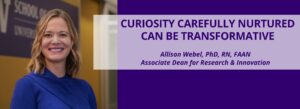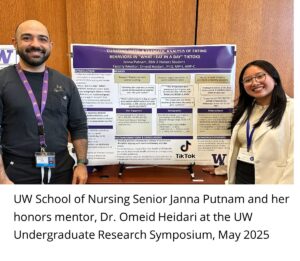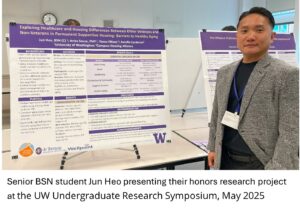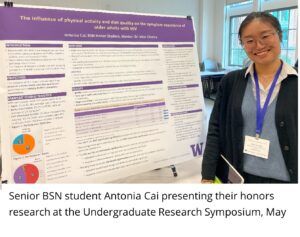
Curiosity is inherent to humanity. Indeed, it is curiosity about others – their ailment, their treatment, and particularly their lives outside of the healthcare setting – that draws many of us to nursing. Yet, aspects of professional nurse training can often make it seem that the nursing profession, and the settings in which we work and learn, do not value this essential curiosity.
I did not pursue nursing school to become a nurse scientist; however, during a two-year experience as an undergraduate honors student, I learned to love the process, potential, and discipline of research. Under the dedicated mentorship of my advisors (most of whom are still dear colleagues and friends), I learned how to ask a discrete research question that would improve the health of patients living with heart failure; create a survey to collect data; analyze that data; and transform numbers on a symptom scale to clear recommendations for improving nursing care. While most of my cohort of undergraduate honors students did not go on to pursue scientific careers, undoubtedly, they learned how our practice can, and should be, guided by high-quality, rigorous, patient-centered evidence.
Each year, approximately one dozen of the UW School of Nursing senior class students elect to participate in a year-long honors research program. They engage in a weekly seminar and work in nurse-led research laboratories where they contribute to a variety of research activities – all tailored to their unique academic interests. This work culminates in a public presentation of their year’s work at the University of Washington Undergraduate Research Symposium.
This event was most recently held on Friday, May 16, 2025, where 16 senior honors nursing students presented 11 posters alongside more than 1,000 other graduating seniors. On this joyful occasion, I spoke with a few of these graduating seniors to learn how their yearlong research immersion impacted their time at the University of Washington.
Janna Putnam embarked on a timely research project under the mentorship of Dr. Omeid Heidari, exploring how social media shapes dietary habits. Her study, Curating Diets: A Thematic Analysis of Eating Behaviors in “What I Eat in a Day” TikToks, delved into the subtle yet powerful ways digital content influences food choices and perceptions of health.

What made Janna’s journey notable was the independence she was encouraged to take on from the very beginning. Dr. Heidari challenged her to design and lead a completely new research project—an ambitious task for someone new to qualitative methods. Learning how to connect thematic analysis to broader research aims was no small feat, but Janna rose to the challenge with determination and curiosity.
Through this process, she not only developed a strong foundation in qualitative research but also deepened her understanding of the intersection between media, behavior, and health. Reflecting on the experience, Janna shared:
The [important] role of research in healthcare sparked a stronger interest in evidence-based practice. It also reinforced my goal of becoming a nurse who actively integrates research into clinical decision-making.
Janna’s work highlights the growing relevance of digital literacy in healthcare and the importance of equipping future nurses with the tools to critically evaluate the media-driven narratives that shape patient behaviors and expectations.
Jun Heo undertook a powerful and emotionally resonant qualitative research project under the mentorship of Dr. Anita Souza, exploring the differences in healthcare access, social integration, and aging-related needs between older veterans and non-veterans living in permanent supportive housing. Jun describes the experience as “tough, but inspiring”—a phrase that captures both the emotional weight and transformative nature of the work.

Interviewing older adults with histories of chronic homelessness presented unique challenges. Many participants shared stories marked by trauma, isolation, and deep-rooted distrust in systems meant to support them. Navigating these conversations required not only sensitivity, but also a commitment to ethical and trauma-informed research practices. Jun and Dr. Souza grounded their approach in trauma-informed interviewing, engaged in regular debriefing sessions, and maintained reflexivity through detailed field notes—ensuring that participants’ voices were honored with care and respect.
This experience profoundly shaped Jun’s understanding of what it means to provide care. Listening to how housing instability, system navigation, and long-term marginalization impacted participants’ well-being shifted their perspective from bedside care to a broader, structural view of health. Some participants even described the interviews as therapeutic—an unexpected reminder of the healing power of being heard.
Reflecting on the experience, Jun shared:
I now see myself working not just at the bedside but also in roles that address structural determinants of health, especially in gerontology, trauma-informed care, and housing-based healthcare solutions for older adults.
Jun’s journey illustrates how research can be a catalyst for empathy, advocacy, and a reimagined vision of nursing—one that bridges clinical care with social justice and systems change.
Antonia Cai made a meaningful contribution to the ongoing PROSPER-HIV study, which explores how physical activity and diet quality influence symptom experiences among older adults living with HIV. Under the guidance of Dr. Vitor Oliveira, Antonia conducted a secondary data analysis examining how lifestyle factors—such as daily step count, moderate-to-vigorous physical activity, and diet quality (measured by the Healthy Eating Index)—correlate with symptom burden in this population.
 One of the most significant challenges Antonia faced was navigating complex statistical methods with limited prior experience in quantitative research. Learning to interpret regression analyses and control for covariates like age and sex initially felt daunting. However, with Dr. Oliveira’s mentorship—including a tailored data analysis workshop and hands-on practice with statistical software—Antonia steadily built her confidence and competence.
One of the most significant challenges Antonia faced was navigating complex statistical methods with limited prior experience in quantitative research. Learning to interpret regression analyses and control for covariates like age and sex initially felt daunting. However, with Dr. Oliveira’s mentorship—including a tailored data analysis workshop and hands-on practice with statistical software—Antonia steadily built her confidence and competence.
Despite the steep learning curve, Antonia emerged from the experience with strengthened analytical thinking, enhanced data literacy, and a deeper appreciation for evidence-based reasoning. She reflected on the value of this opportunity, stating:
As a future nurse, especially one interested in critical care or research-based roles, these skills will be essential. They will help me evaluate interventions critically, contribute to quality improvement, and advocate for patient-centered care that includes both medical and lifestyle-based approaches.
Antonia’s journey highlights the transformative potential of research engagement in nursing education—equipping future clinicians with the tools to bridge science and practice in meaningful, patient-centered ways.
Curiosity carefully nurtured can be transformative. A core mission of higher education is to inspire students to cultivate their curiosity and experience transformative learning that contributes to building a healthier society for all. The undergraduate honors program at the UW School of Nursing helps us fulfill this goal. We are so fortunate to have remarkable undergraduate students who will undoubtedly become remarkable nurses. In their words,
Research taught me how to listen more deeply, think more critically, and hold space for complexity—all of which directly support the kind of nurse I want to be.